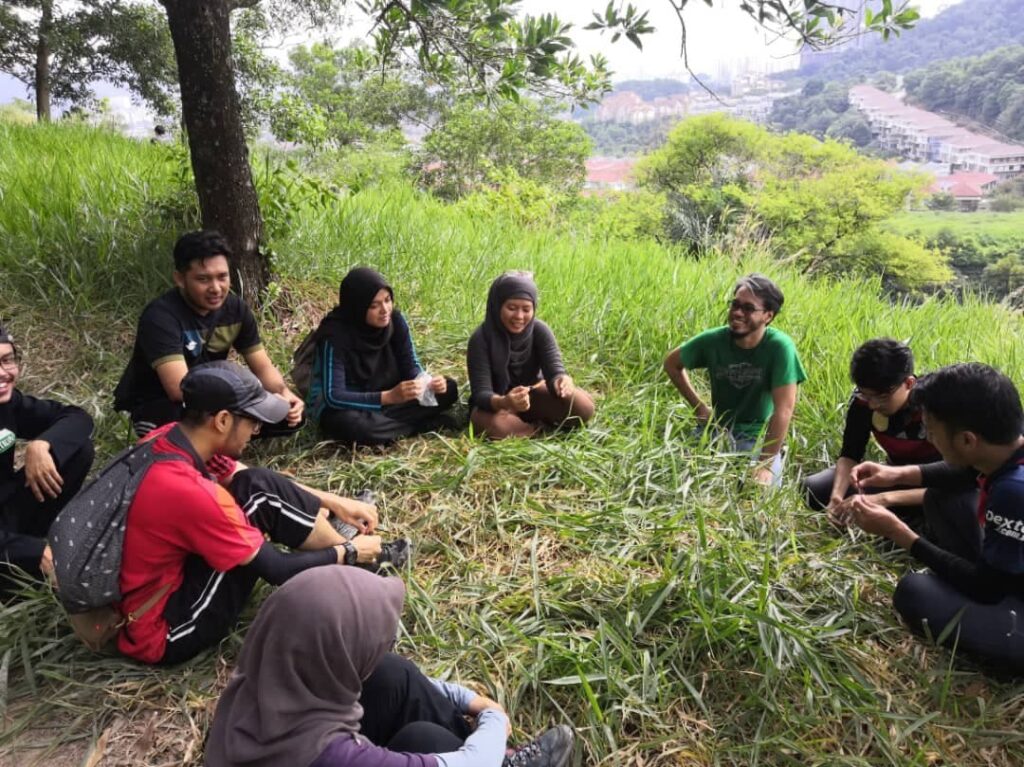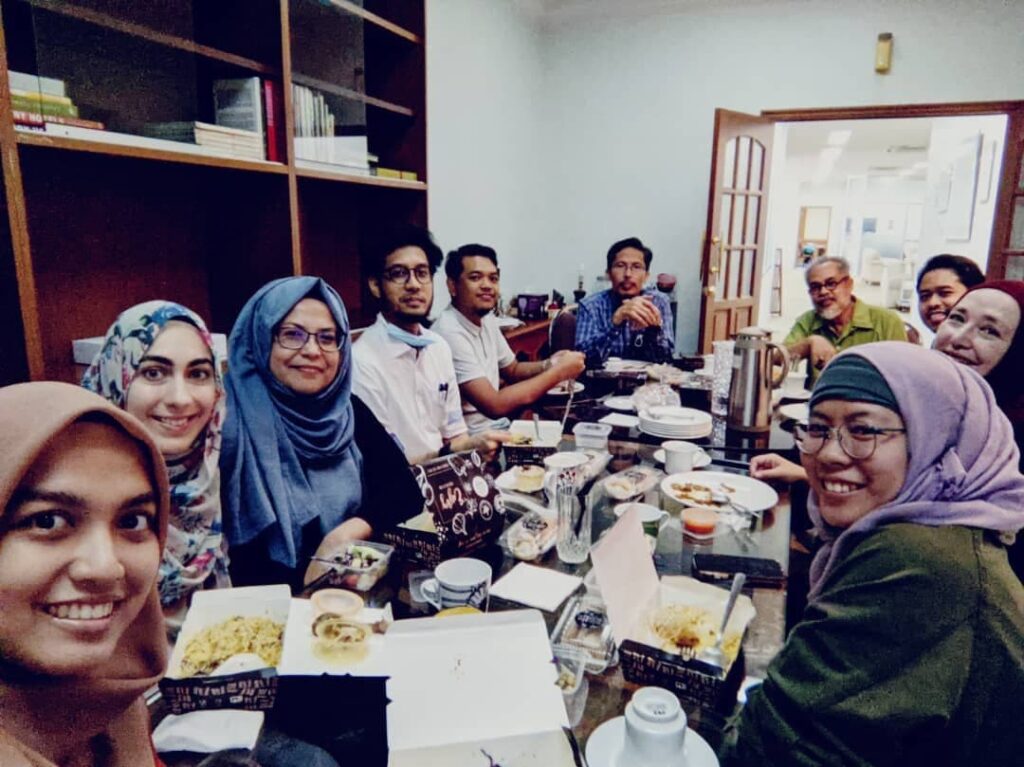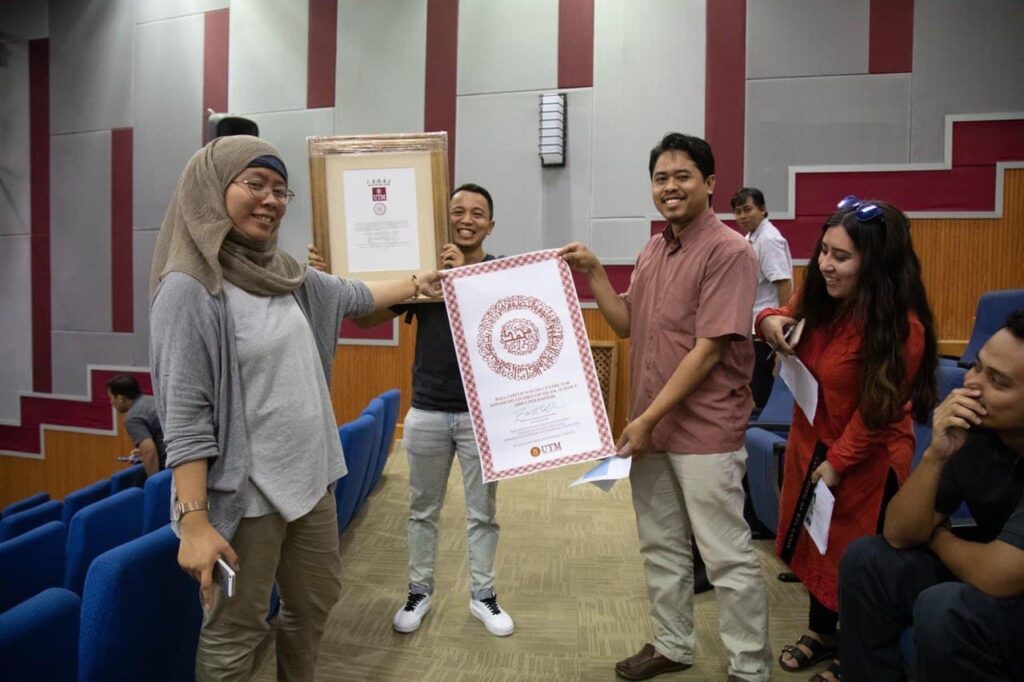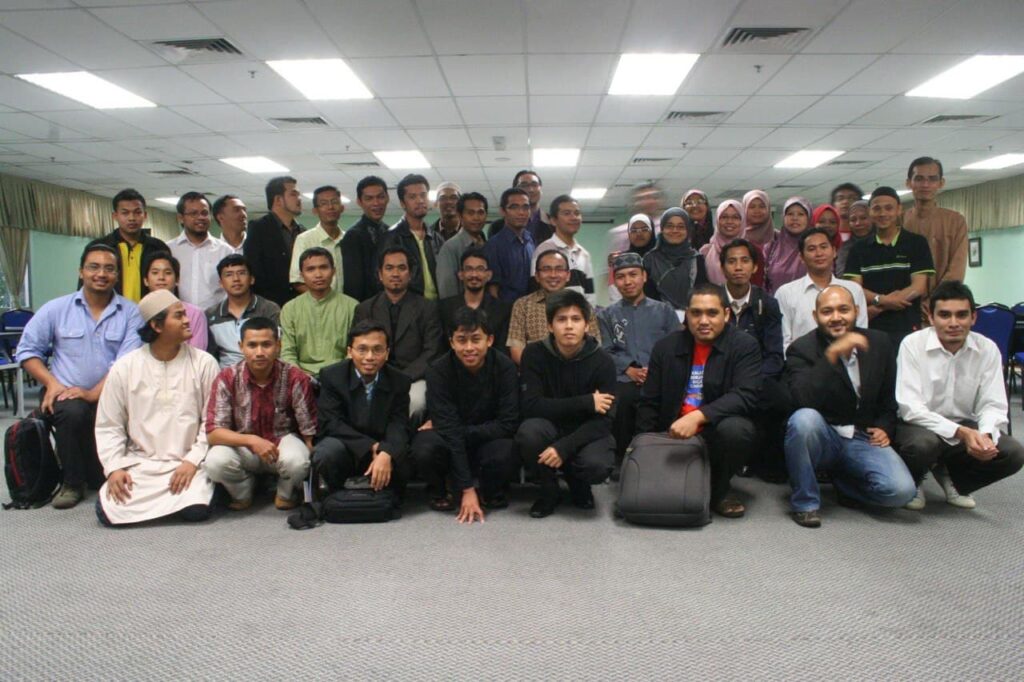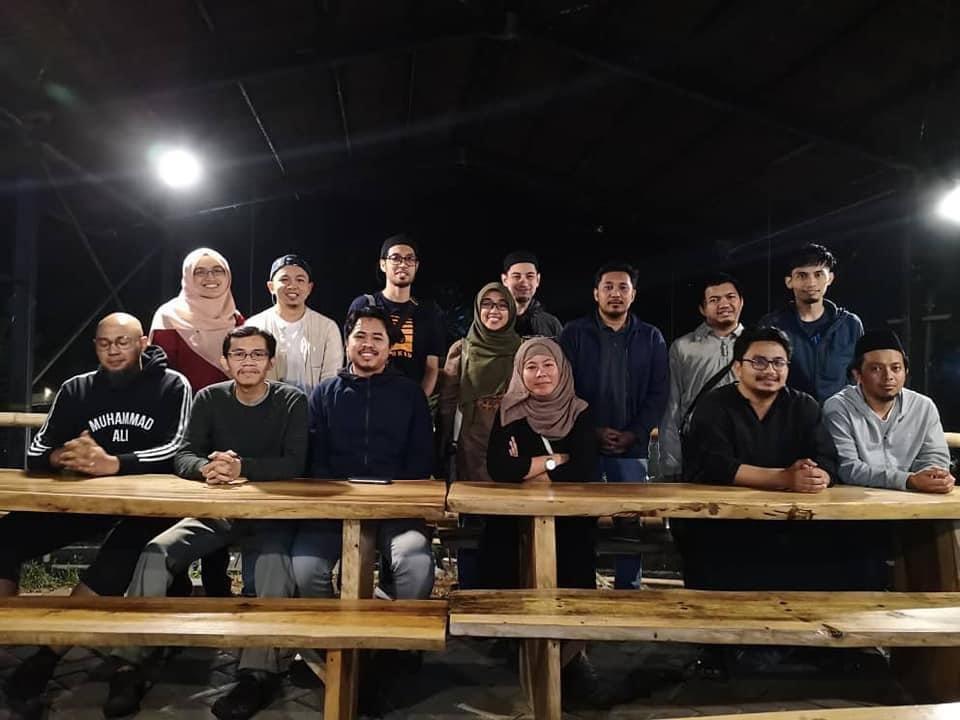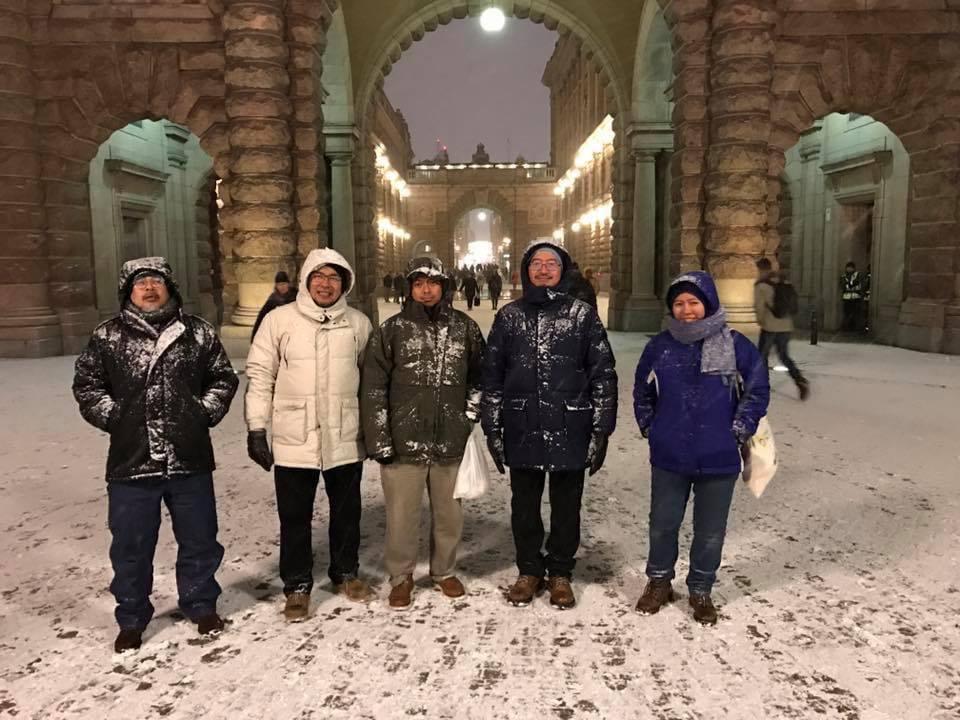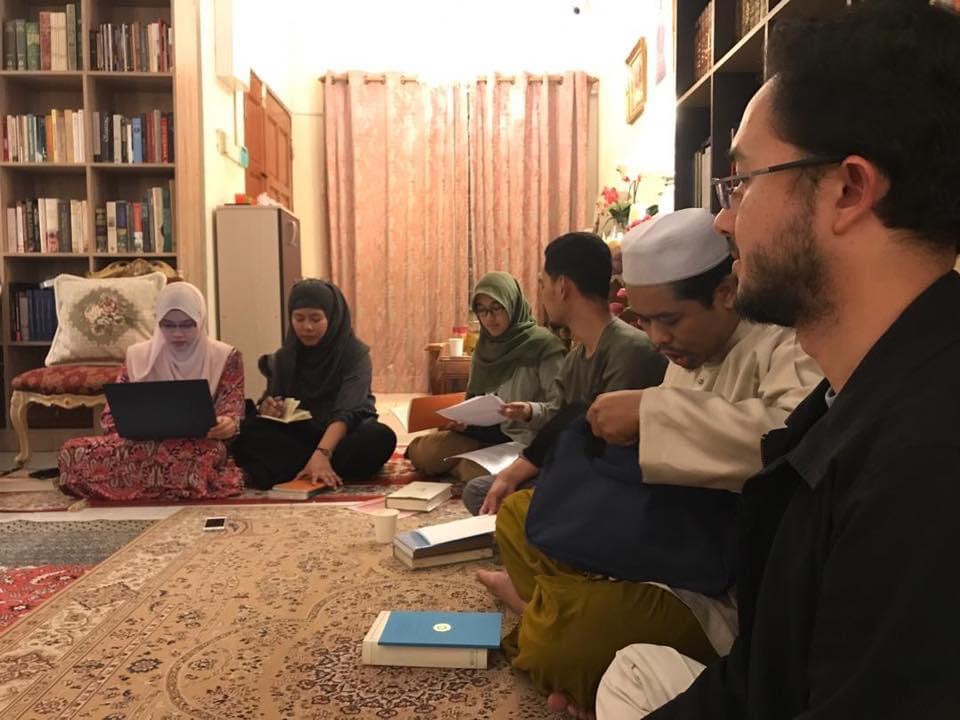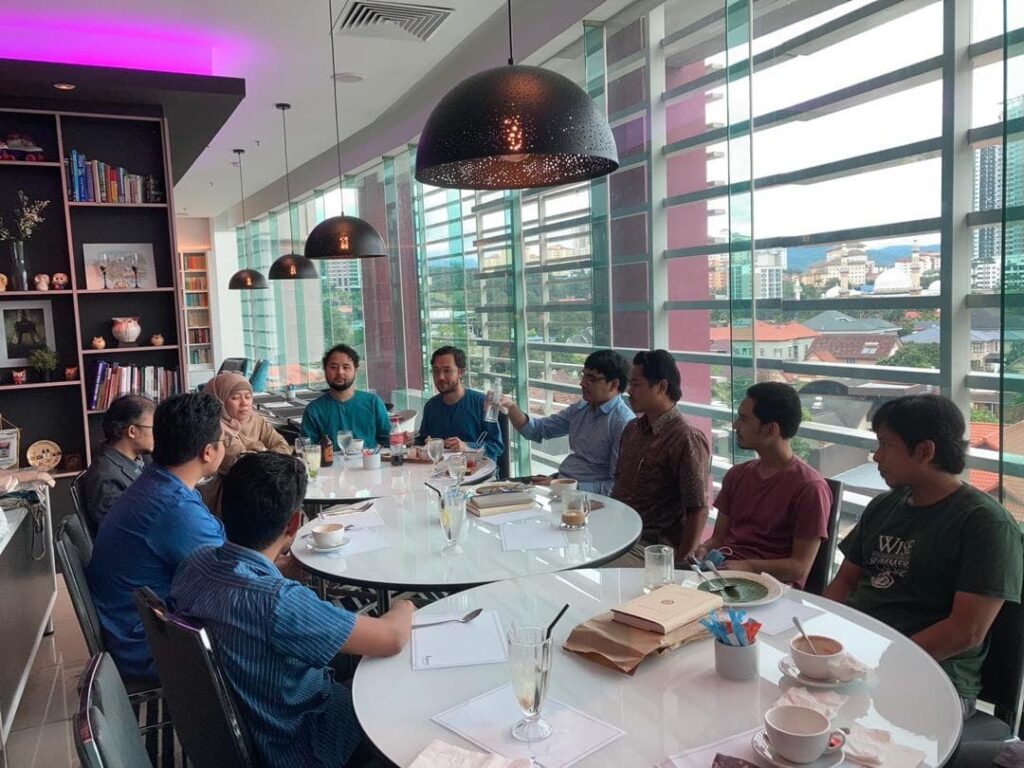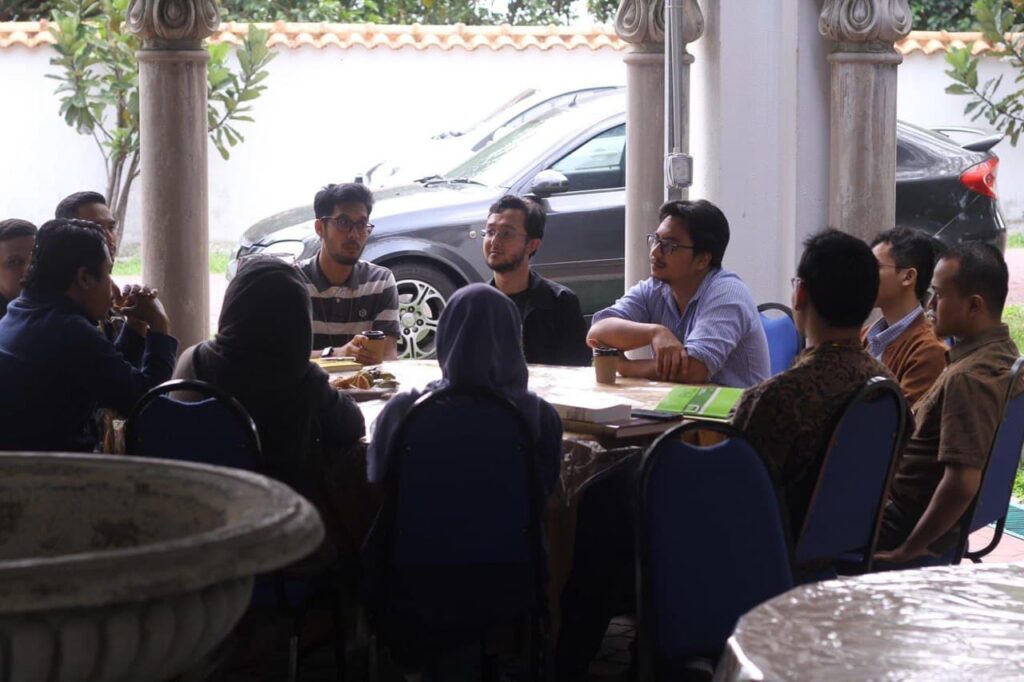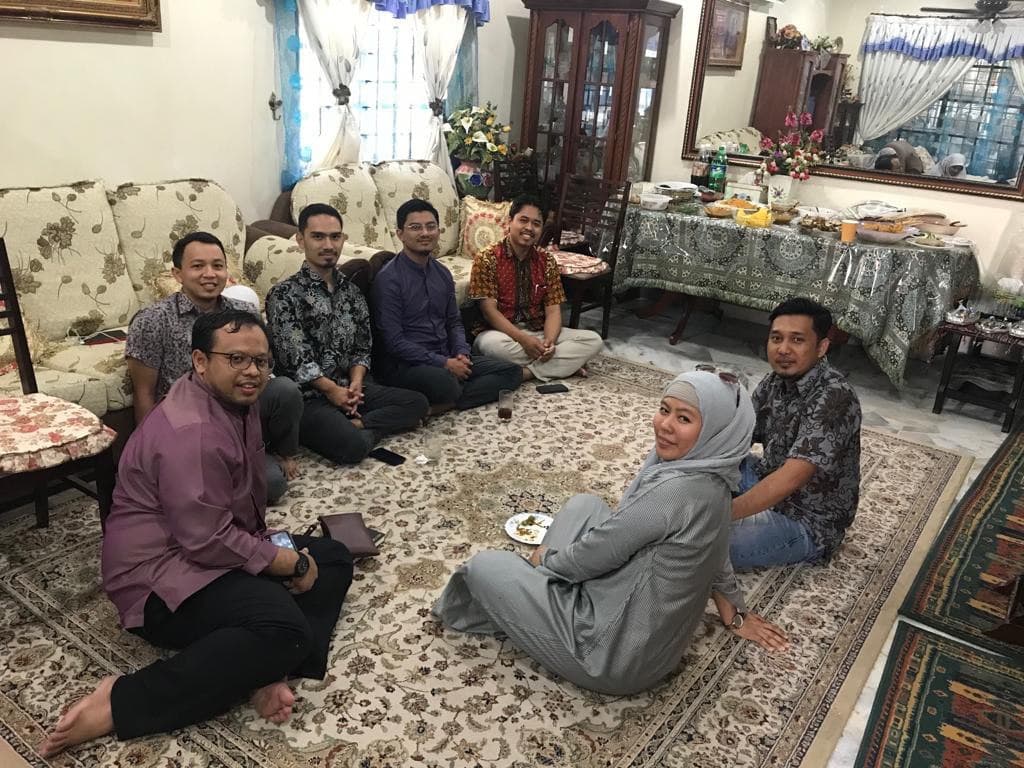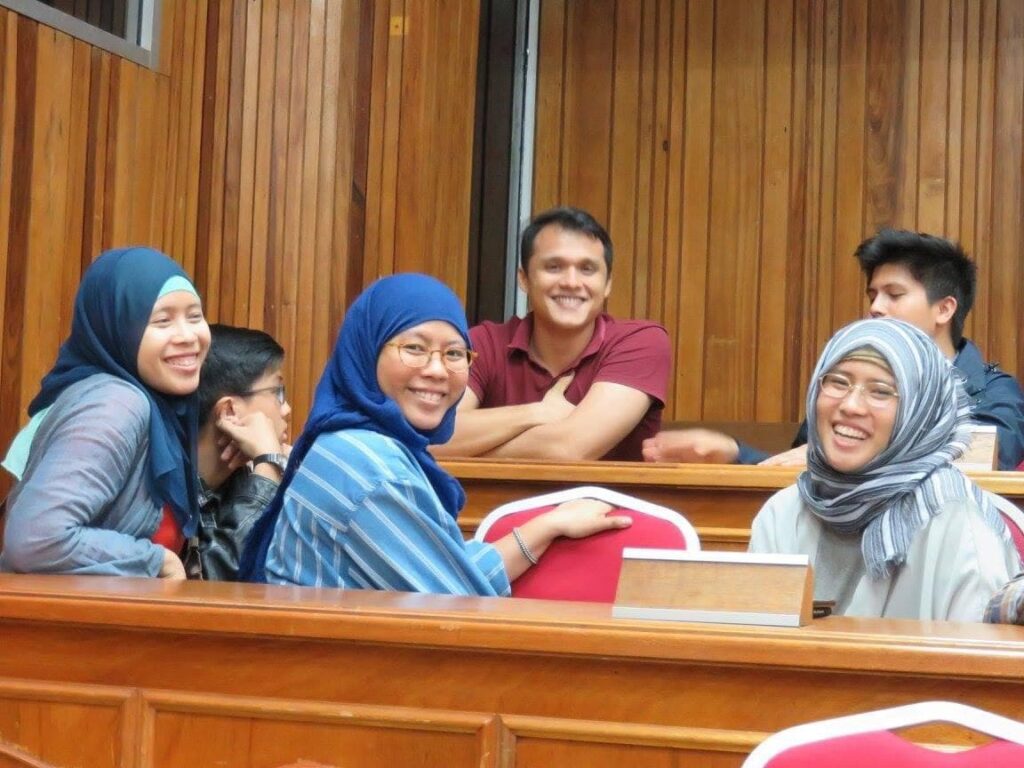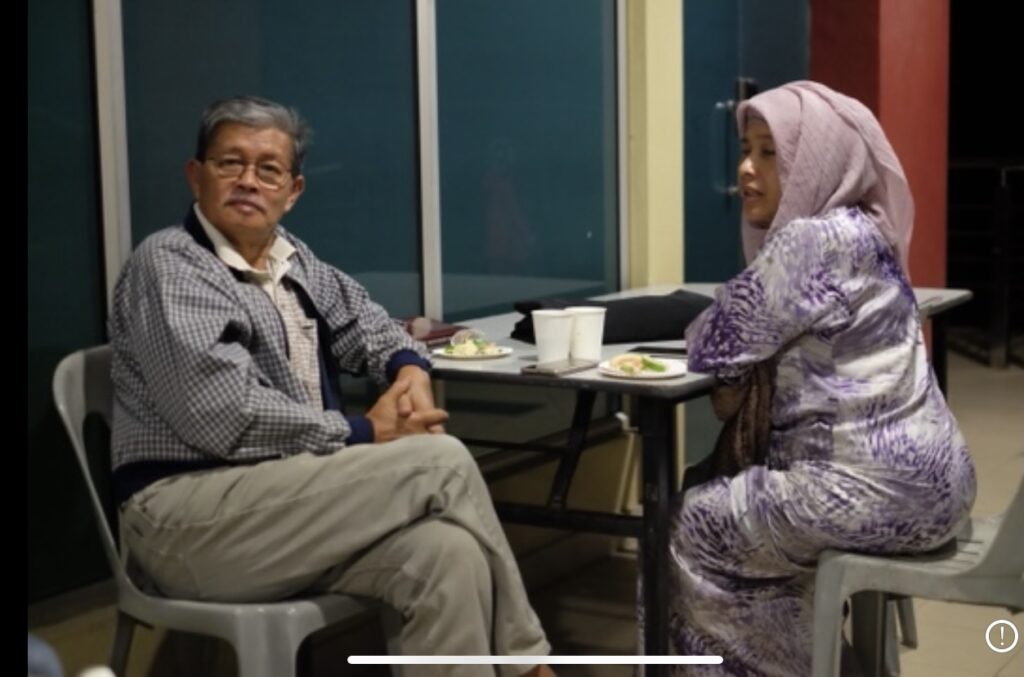By Sharifah Hajar Almahdaly
MPhil (2012-2016) and Phd (2016 – ) at RZS-CASIS
Since the beginning of my first semester at CASIS in February 2012, I have held on to a piece of advice that Prof Dr. Wan Mohd Nor Wan Daud consistently shared with the students: to always take care of the people around us— not just by being concerned with the wellbeing of our colleagues, teachers and admin staff, but also by helping each other strive and develop in our learning experience through collaboration. Most importantly, he reminded us to aid others not just when it is convenient, but to know when you ‘have to’, even if it is difficult. It is when things are difficult is when it might be the most necessary . This was the ‘spirit’ of CASIS that was impressed upon me as a new student.
Knowing fully well at the time that I was comparatively inexperienced in the academic discourse of my peers and that I was far from reaching their level of intellectual acumen, I focused my energy on contributing to matters that some might find petty. As many would attest, the first semester of the CASIS journey is very challenging, eye-opening (and, might I say, nerve-wracking), but an equally satisfying experience. For someone like myself who has a background in the hard sciences, the lecture-style and bookish academic culture was something fairly alien to my learning habit.
We were bombarded with a year of long reading and writing assignments, Arabic language exercises, and so many presentations that almost everyone lost track of which assignments accounted to which deadlines. Wan Ahmad Fayhsal, who was among the earlier students at CASIS (but completed his studies elsewhere toward the final year) mentioned one fine day during class that we needed some organisation to keep track of those dates. The mathematician in me thought that I could at least take all of those variables and arrange them into an organized whole as I had just done for myself and my peers the year prior while completing a Diploma in Education in Penang. Hence, I volunteered to initiate a generally shared schedule among my classmates to monitor our deadlines and solve the challenges we had in class.
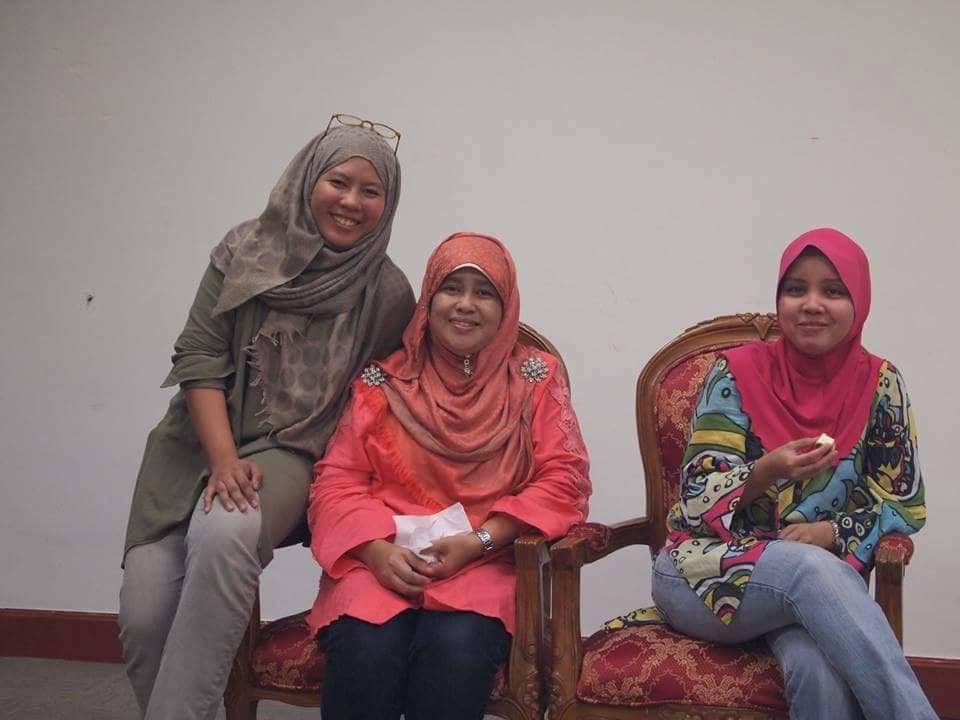
That shared schedule turned me into a walking planner for everyone in the class, and then for the staff, and then for our teachers. I had become an accidental secretary. While pursuing my undergraduate degree in mathematics in the United Kingdom, I was hardly the most organized, systematic, and up-to-date student in my batch. I had enjoyed my undergraduate time too much, engaging in more culturally enriching extracurriculars instead of education-based activities that I thought it was time to change for the good. As time went on, CASIS became more active in our internal and external events, more people begin to notice our programs, and good communications and public relations became a necessity. The number of students and teachers increased, and eventually more information needed to be sorted and organized to resemble a working plan. It was not a one-person job.
At that time, CASIS was very new with only three administrative staff provided by the university for this small center to function,(1) and none of them were allocated to handle the general academic management for this new center. We were also placed in a temporary location outside of the main campus on level 18 (the top floor) of Bangunan Yayasan Selangor, Jalan Raja Muda, Kampung Bharu. Being far from the main campus naturally made us independent and able to function as a full micro-university with our progressing activities. Given our active engagement with the public, it was an organic development that several existing organisational gaps were filled by students who understood the aims and objectives of the activities proposed by our teachers, from classroom management to event execution.
As early as 2012, we were honoured to conduct the first series of CASIS Saturday Night Lectures with Prof. al-Attas on a fortnightly basis.(2) His former students and supporters from around the country began gathering at the gates of UTM, reliving the lost years of empty Saturday nights to be filled with banquets of knowledge. New supporters began to look for new and old publications of al-Attas’ writings, and suddenly CASIS became the central resource for al-Attas’ books which had been kept in storage in the basement of ISTAC since his removal.
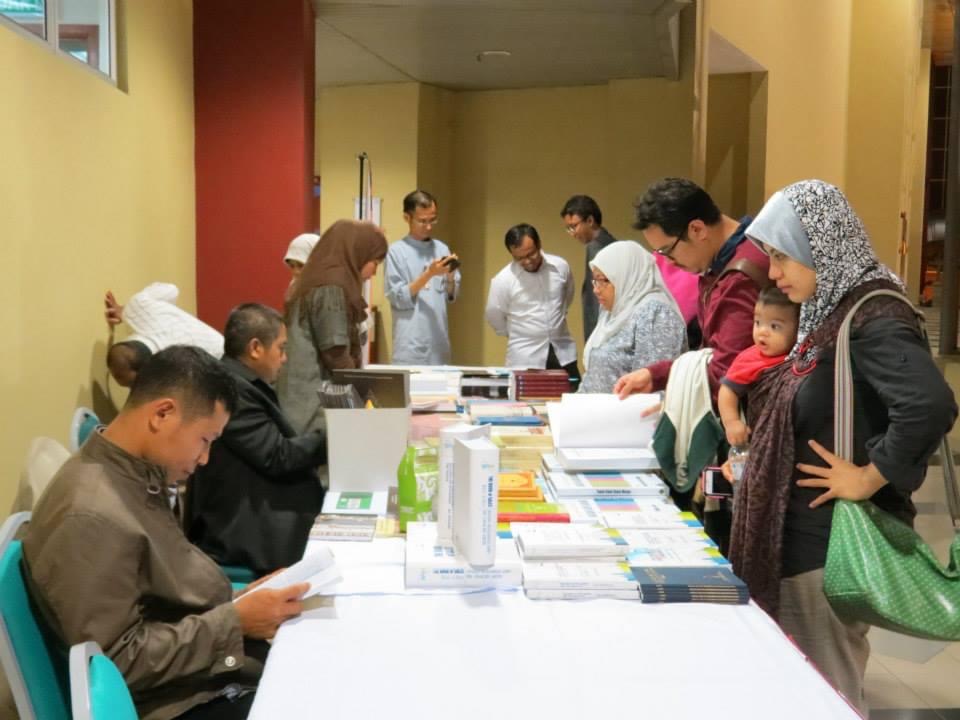
Preparation begins 2hrs before program begins
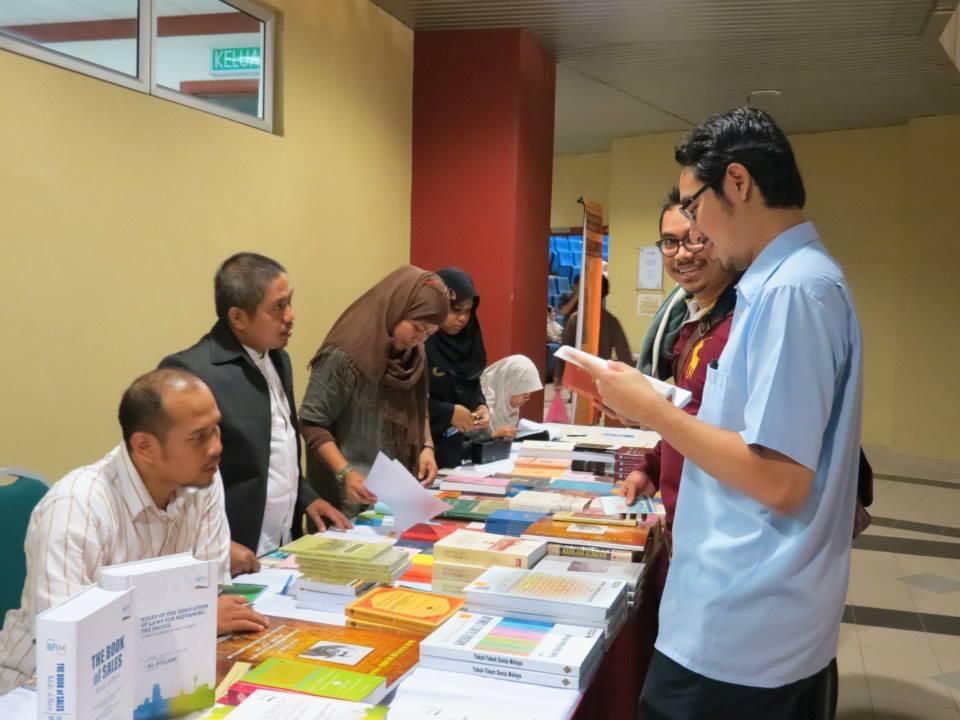
Saturday Night Lecture at Dewan Azman Hashim, UTM KL, 2012
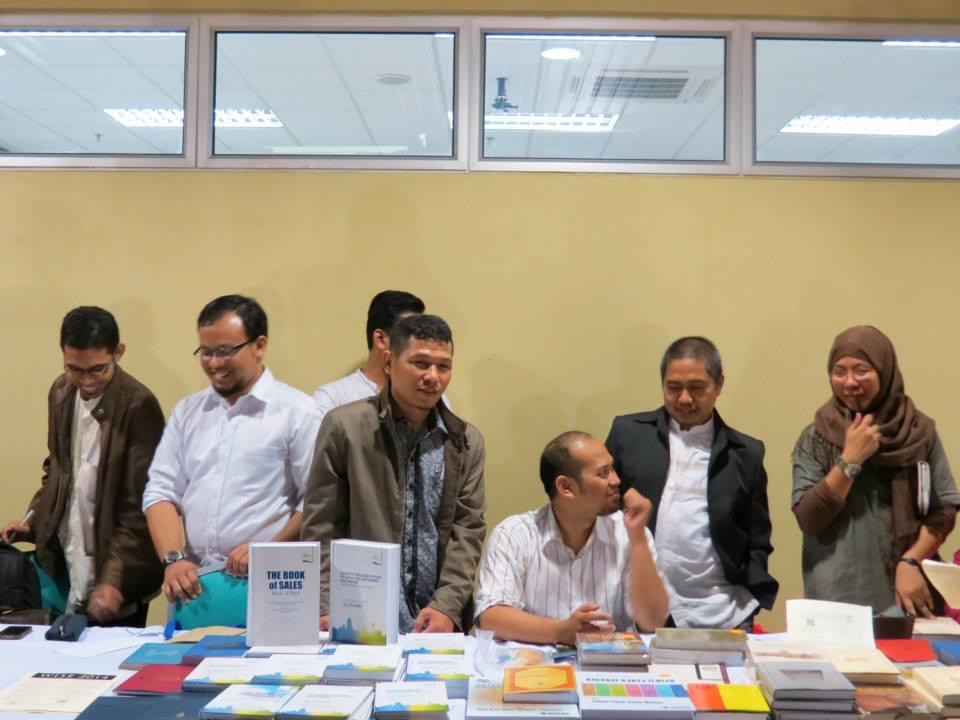
There were no independent booksellers at that time who knew how to take up global publication and distribution except for several members (3) of the Himpunan Keilmuan Muslim (HAKIM)(4):— an organisation made up of a group of young, active individuals based in Kuala Lumpur who gathered to form a study circle; and eventually, helped coordinate and provide the platform for discourse on al-Attas’ ideas. To fulfill the book demands during our regular events, a booth was opened, and manned by CASIS students; although the buying and selling of books under a small center are not part of the normal activities of public institutions like universities, which usually have their own entities under the university publishing house to centralise sales, distribution and other matters. Several students including Metsrawirman, Haerul Anwar, Ali Muchtar, Rahmat Hidayat, Zakki Azani, were the first few who volunteered to man the booth and monitor the stocks.
Eventually, more work needed to be done in bookkeeping,(5) Brother Metsra and Ali Muchtar were the key people who devoted their time to managing book sales and developments during the beginning phase; then, was later passed to the CASIS Student Council sometime in 2014, during which brother Zul-Faisal took over. A year later the management changed to my name, with co-management by other individuals like Rizky Febrian, Khairi Zainal, Imran Halimi, Nur ‘Alaniah, Amru Khalid, Sarif Hidayatullah, Syed Mahdi Almahdaly, and occasionally other students who helped out at the selling at the booth during events. Even the admin staff (6) helped to man the physical store at the corner room of the office whenever buyers came when no students were around.
I benefitted tremendously from HAKIM’s programs, specifically, the one year Kursus Pandangan Alam Islam Bersiri (WISE)(7) program that was first offered in 2011 in Malay with the direct involvement of ISTAC alumni who were al-Attas’ students; at the time known as Ta’dib International.(8) The initiative was a continuation of what had been instigated by the postgraduate students at ISTAC under the name Siri Kuliah Pandangan Hidup Islam (KPHI) and later on restructured to what we have today for the general thinking masses. It was through WISE’s structured curriculum introducing the elements of the worldview of Islam that I came to know about CASIS and al-Attas, and thanks to my high school friend, Syafiq Borhannuddin, who had invited me to sign up that one fine summer. It was a case of being at the right place, at the right time. When Prof. Wan was invited to establish CASIS under UTM by Dato’ Sri Ir. Zaini Ujang, the then Vice Chancellor of UTM in 2010 (officiated on 21st February 2011), WISE had also just started as a 3 semester, 1 year weekly program the following year. Back then i was doing my 1 year Diploma Education in Penang and would drive back and forth with my small manual Kelisa every weekend to join the WISE discourse for a year, and was really keen to discover the meaning of education in Islam. After completing the Diploma, I waited for my appointment from the Ministry of Higher Education for my posting but did not receive any letter calling me to serve as a teacher, and so I took the next step of joining CASIS after being convinced that I needed to improve my own knowledge of matters pertaining to the Islamic Philosophy of Science and Education, thinking I would do more justice to equip and prepare myself with the right Islamic Framework before going into teaching, in case I would be called. Through these connections, the first few batches of CASIS postgraduate students comprised of graduates from WISE, and managed to gather like-minded people to be finally introduced to the works of al-Attas in a formal institutional setting. 95% of the first batch of students at CASIS were those who came from that program, which still held true subsequent to that.(9)
Thus began my journey of collaboration and affiliation with individuals, fellowships, organizations, and institutions. Institution play a role in shaping the behaviour of socio-politico-economic agents such as the individuals and organizations within them. Institutions also influence the direction of one’s course through the principles that they adopt, but the adjustment to external and internal challenges is where the role of personal relationships and fellowships becomes the key to realizing those principles. Having a collective body like CASIS that acknowledges these principles would become a form of powerful unity in one’s aims and objectives of education.
This highlights the importance of the establishment of CASIS as an institution that aims to inculcate the educational philosophy that serves to rectify the missing metaphysical framework in both the social and natural sciences as espoused by the works of Syed Muhammad Naquib al-Attas, as stated in our vision and mission. Without such an establishment, individuals who consisted of WISE Alumni and members of the HAKIM Study Circle, and who came from various fields like engineering, physics, economics, mathematics, history, biology, architecture, geology, literature, media communications, philosophy and more, would not be able to gain proper training and guidance in self-development in terms of scholarship. However, the dynamic interactions between individuals who make up an institution determine the quality of that organisation. Not all organisations are then institutions on their own; rather, institutions require organisational actions by individual actors who understood their purpose to achieve their desired objectives.
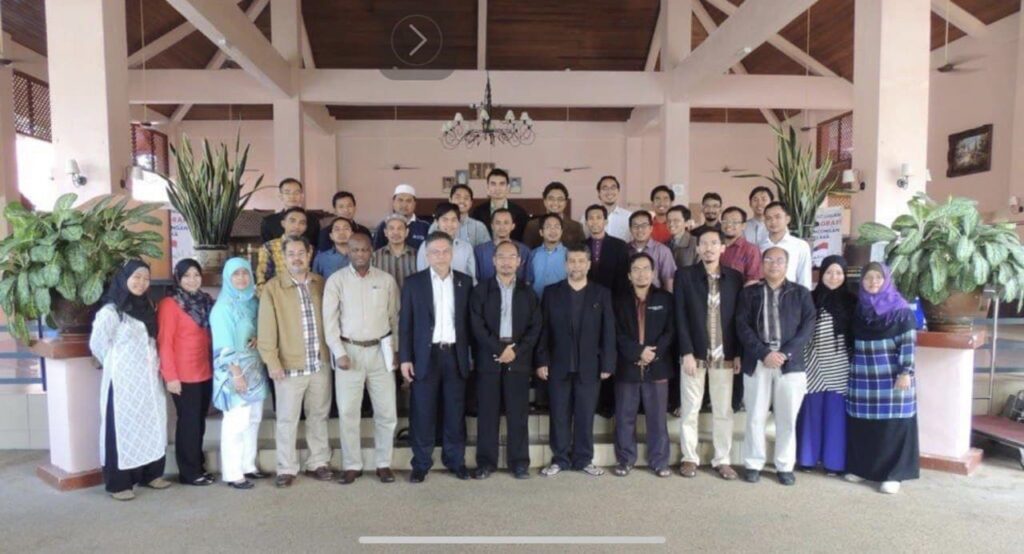
The hierarchy and centralised institutional systems largely practiced in our university settings are heavily influenced by the institutionalisation movement as experienced in the West, i.e. the structure of the state to reach social autonomy. This was a movement towards the rationalisation of their surroundings with the aims of maintaining order, control and industrialising society. The institutional structure that we endeavour toward here is not that. What is missing in today’s higher education system are institutions that are unapologetically governed by religious values and aims; the Shari’ah. The notion of Shari’ah here is not the rigid understanding of the law that uses dogmas to control the community that subscribed to it; rather, it is a self-regulating law as outlined by our religion, such that the authority does not depend on the temporal factors of creation. It instead holds the authority of something that is permanent and transcendent. As Prof Wan stated it in one of his writings:
“The various political and administrative institutions that Muslims had established, viz., the caliphate, sultanate, the ministries (wizārah), the offices of the judge (qadi), police (shurtah), the various councils (shura, majlis, diwan, etc.) as well as the hisbah, have served the Community well through the centuries precisely because of the individuals involved therein. Indeed, there was the existence of civil society (mujtama madani) in Islamic history not in the utopian sense dreamt by the Muslims philosophers, but in the sense explained by al-Attas. The Attasian sense of civil society in which maddana (to built cities, and to civilize, humanise) and tamaddun (civilization and refinement in social culture) are ultimately derived from the various, but interconnected meanings of din is perhaps more comprehensive than the siyasah shar’iyyah precisely because Shari’ah is an integral part, but not the whole of religion (din). The Islamic notion and institution of civil society is fundamentally different from those of the modern Western ones primarily because of basic differences in contents of the worldview and in the meaning of truth and reality that it projects….
…Ultimately, institutions are reflections of key individuals within them. We have established and shall continue to set-up various institutions to achieve our collective goals and objectives. Yet, the effectiveness of and respect for our various institutions such as the legislative, executive, judiciary, the media, and non-government organizations, etc, are directly proportional to the spiritual and ethical strength and degree of accountability of the critical people involved therein, not merely to the stakeholders in the world, but more fundamentally, to God Almighty. The right and proper inculcation of the last element shall determine their personal destiny in the After-life.” (10)
Wan Mohd Nor Wan Daud, “Accountability Enhancement: Some Religious, Historical and Educational Considerations”, 2001 [Published in Al-Shajarah, Volume 5, Number 2, 2000],37-39.
In 2013, the CASIS Students’ Council was established among the first few existing students. Heavy involvement in organisational activities is not the best recipe for an ‘easy’ postgraduate life, which demands extra focus and intellectual rigour; But this was not the case with CASIS.
Our educational philosophy encourages us to understand the objectives of education, such as ta’dib, in engaging ourselves with activities that make us reach the highest level of insan adabiy. This adab cannot be understood by mere theories or by reading books; it demands an acknowledgment of the internal and environmental structure by ‘amal (action) in relation to the knowledge of the proper places of things. Therefore, the inculcation of adab in a person, to some extent, necessitates a condition whereby they are given the environment, opportunity, and ability to practice what they preach.
In the serving of justice to ourselves, our friends, our teachers, our community, we experience the vices and virtues within the challenges of operationalising what we understand. I was lucky to have been given the opportunity, environment, companionship, and necessary intellectual and spiritual backing of what was taught in class and in the works of al-Attas on how to overcome even the daily challenges by the remembrance of what is right and wrong.
As the CASIS Student Council unfolded in 2013, proper appointments of responsibilities changed the course of some of our activities for the better. Wan Ahmad Fayhsal was appointed as the president, Khayrurrijal and Syed Muhiyuddin al-Attas were the Vice Presidents, Noor Idayu Wahid was the treasurer, Muhammad Ikhwan Azlan was the head of Research and Discussion, Muhammad Syafiq Borhannuddin was head of Public Relations, Ai Wardah Mardhiah Koswiar was head of Media, Documentation, and Publications, Khalina Khalili was the Vice Secretary, and I was the Secretary. The structure, however, only lasted for a year due to unforeseen circumstances and eventually, Muhammad Ikhwan Azlan became the President with Mohd Hilmi Ramli as our advisor and Wan Mohd Aimran & Mohamad Fahroni Hamdan replacing as heads of Research and Discussion. All our activities were possible also through the trust and support of the admin staff, Puan Sharifah Fadzlina and Puan Rashidah, by being the liaisons between the students and the university management.
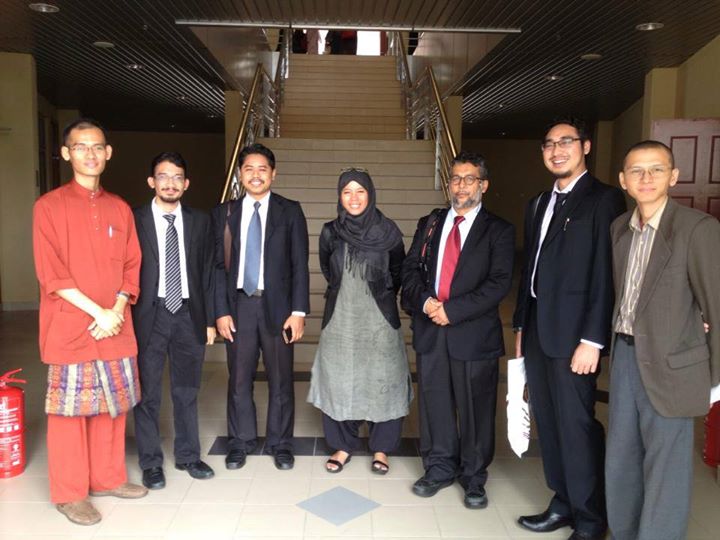
Due to family and work commitments placed upon some of the members of the council, the only two members other than myself who had flexibility in their schedules and lived close by enough to CASIS to execute most of the hands-on activities eventually boiled down to our vice president, Khayruriijal and a junior at that time, Mohamad Fahroni Hamdan. We would spend sleepless nights trying to create the structure of what entails the student society organization, getting new and even auditing students to have the opportunity to be involved with our programs.
Through formalised organization between students, we managed to create complimentary working structures within the small institution at CASIS. We established a Lecturer’s Assistantship system to help manage the classes and communications between teachers and students— an idea that was suggested to me by Ali Muchtar from his experience as a student at Gontor. The Lecturer’s Assistants were made up of purely full-time and even auditing students who were chosen based on their sincere and disciplined attitude towards knowledge. Due to the informal structure of the appointment (i.e. not officially recognised by UTM), all the Lecturers Assistants gladly took up the task as volunteers with no institutional appointment or any form of financial compensation. The responsibilities of the position did not necessitate a particular set of existing skills, so as long as appointees were willing to adapt to the needs of the position, they were welcomed. Major responsibilities include: anticipating, monitor, and serving the needs of the class, as well as maintaining a good relationship with teachers, staff and students at CASIS so as to be able to represent our institution justly. These kinds of tasks are dynamic in nature, hence time commitment varies according to the specific needs of the course and what each volunteer is willing or able to contribute.
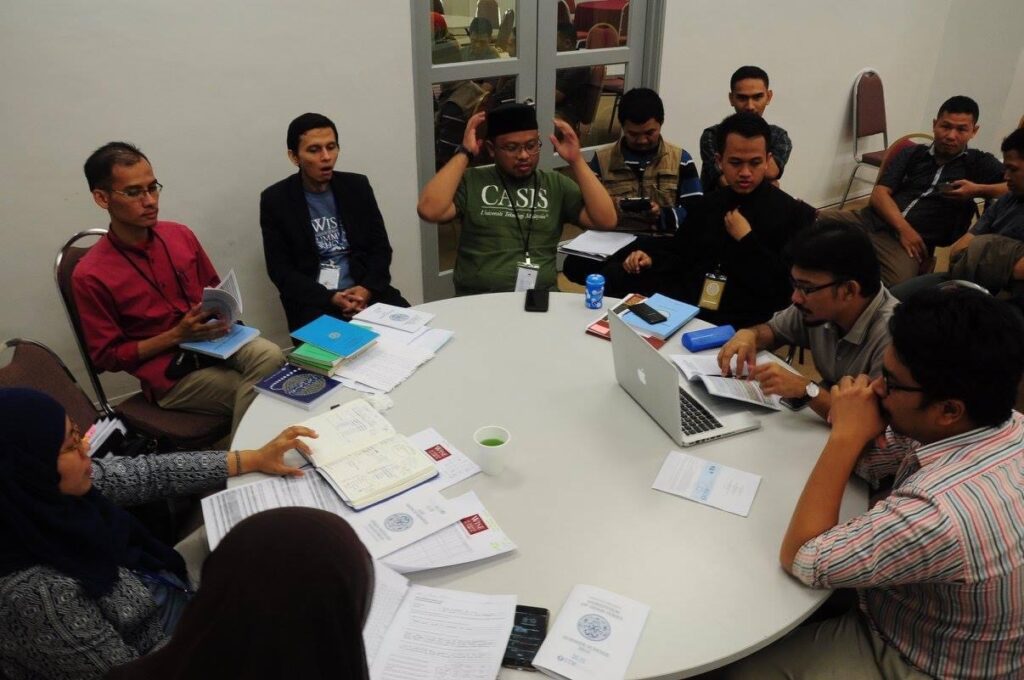
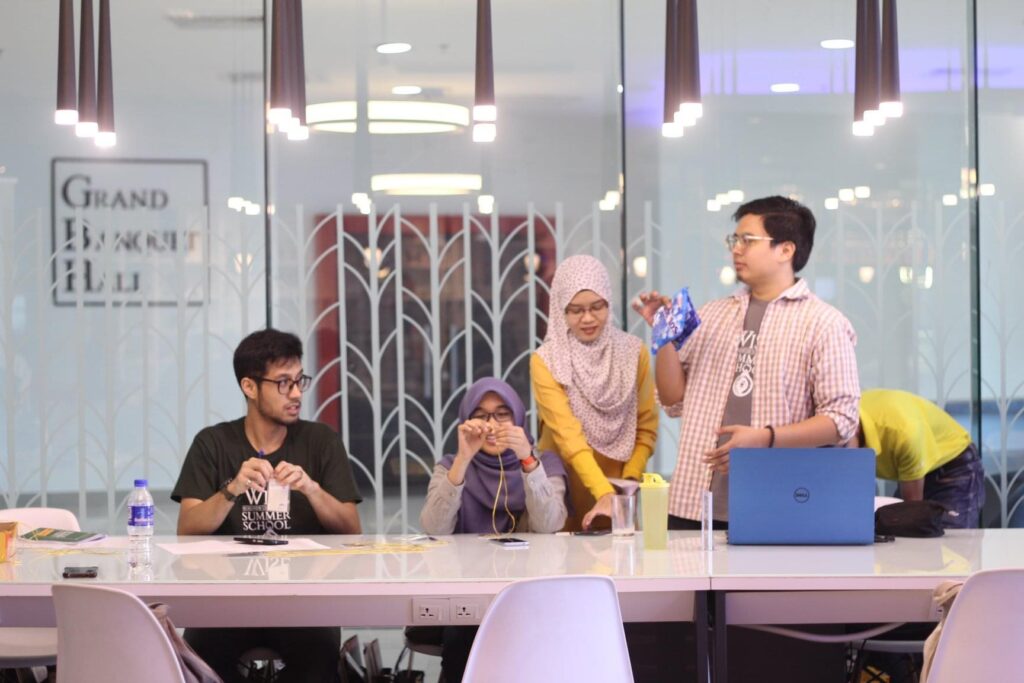
We also appointed and trained students to form executive committees to conduct international seminars, workshops, symposiums, royal events and summer schools that made up of not only the CASIS students community but also outside supporters, student’s family members and WISE alumni. These were all involvements based on their own devotion and sincere intentions to see the institution grow and represented properly. For example, most of our media team (i.e. photographers, videographers, social media managers, graphic designers) comes from outside supporters who do these tasks professionally but volunteered to lend a hand during most of our events. (11) In addition to that, a group of professionals from various industries were also key and have been tirelessly engaging in our programs through HIKMA Fellowship. (12)
As mentioned above, our work structure at CASIS is dynamic, such that it expects a task to be completed according to one’s initiative and capacity but at the same time, must be able to adhere to maintaining standards of quality and integrity of knowledge to a level of excellence. There is no need for a standard operating manual because our actions are united through a common framework according to what was taught by our teachers. Checks and balances are merely a testament to our sincerity and patience to internalise knowledge. Unlike other organizational hierarchies, individuals who are helping out on institutional matters at CASIS are all answerable to our teachers as recognition of respect instead of mere superiors, and colleagues are regarded as companions where we try to grow in both adab and knowledge with each other.
Due to the lack of sources to be found in the university library which specialises in technical education, we also initiated our own small reference corner, with the guidance of Prof. Zainiy who used to be the ISTAC librarian. Some of the books were acquired through a budget from grants and research projects, but most of the books in the CASIS Mini Library and References were contributions from our teachers’ personal collections (Prof. Wan, Prof. Zainiy, Dr. Khalif and Dr. Wan Suhaimi); gifts and private collections from our formal students, auditing students and supporters; as well as contributions from the profit made by the CASIS Bookstore. Cataloging and managing the library required great energy and devotion of CASIS student volunteers,(13) together with some of the help given by the Directors’ personal assistants throughout the years, (14) especially with cataloging books purchased through the Director’s office.
The students were also very much involved with the publication process of our works under the tutelage of Prof. Zainiy, who trains us from zero to a finished product in a collaborative manner. This is also made possible by close affiliation to one of CASIS’ former students’(15) publication house, Klasika Media and printing press, Tukang Buku. They have been very instrumental in helping our institutions in terms of resources during the current pandemic when the university closed and we needed their services to print out forms, meeting minutes, letters, and such to be sent to our academic and admin staff. Due to the flexible appointments of CASIS enrolled and audit student team members during the publication process, we were able to collaborate with other institutions such as Yayasan Ta’dib, Persatuan Pendidikan Futuwwah, and HAKIM to execute publication.(16) All of these contributions were made by students while studying, doing their research, teaching, and working at the same time.
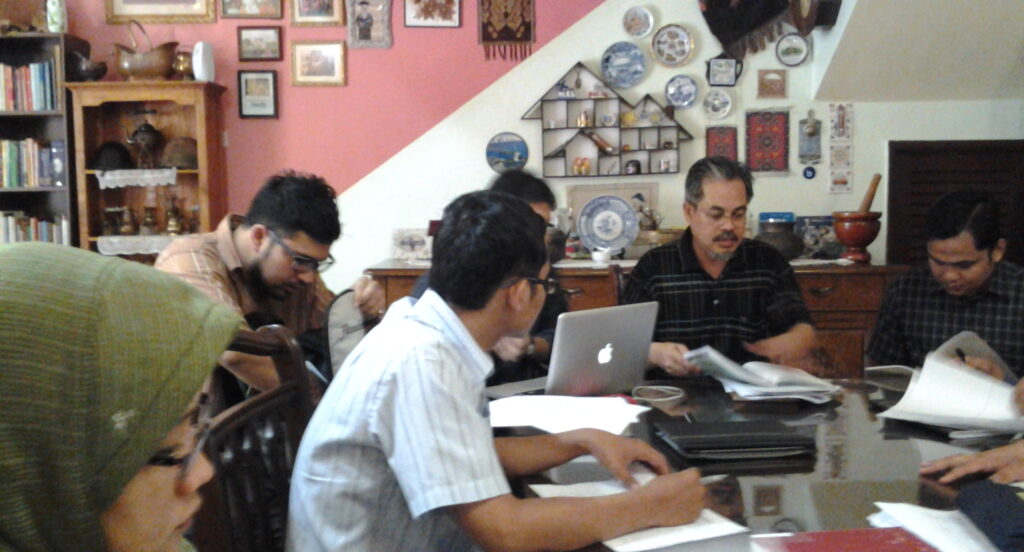
At Dr Wan Suhaimi’s house for Aqidah class on the weekend when the university was closed, 2013
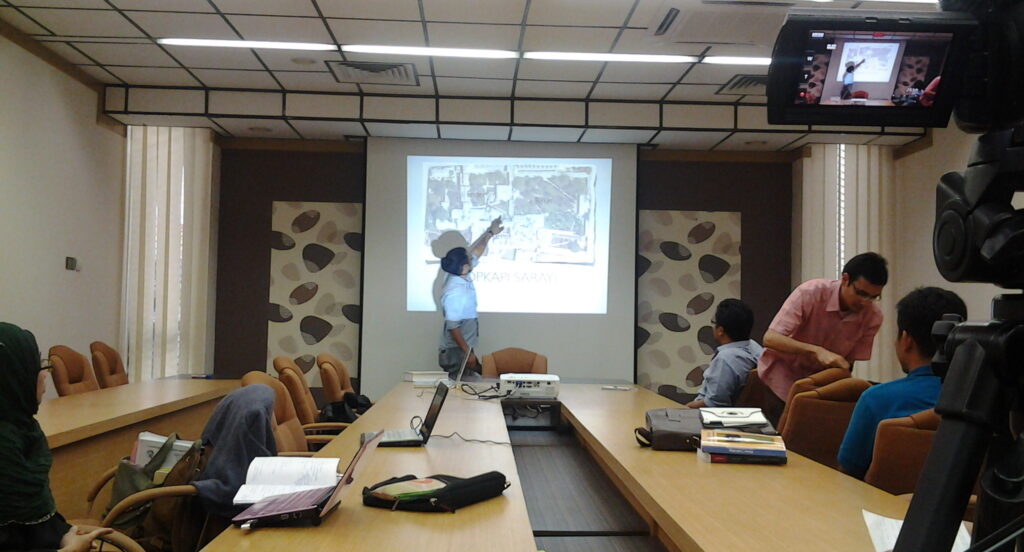
During one of our Luncheon sessions where we share our research progress to our fellow colleagues, 2012
As a postgraduate center with very limited time to bridge between students’ previous academic/professional backgrounds and philosophy, thought and civilisation subjects, the courses taught at CASIS require one to have diverse prerequisite knowledge of various fields. Hence, it is assumed that all students would come in with the capacity to master their own field in order to be able to cross through the many elective courses offered. Not only that, but the compulsory courses are also beneficial to build one’s conceptual framework through the lens of the Islamic Worldview to facilitate the connections between fields. To uphold the collegiate spirit among the students, Khayruriijal and Fahroni coordinated the collaborative learning sessions continuing from the initiative made by Dr Syamsuddin Arif to facilitate the internal development of our friends so as to recognise each other’s strengths and benefit from them. Some of which were conducted in a form of induction day, induction week and induction month to ease the transition of new students from various backgrounds to our educational philosophy. Other forms of collaborative learning were in form of Arabic, English and Malay tutorials (17), book reading, book reviews, thematic sharing, workshops and more. Every student who was able would give their time and contribute by filling in these collaborative sessions for the benefit of all.
But as time goes by, being adult students with no financial sponsorship to sustain our livelihood, the sustenance of the Student Council structure began to transform itself. Many would always end up having to stretch themselves thin to serve the institution. As a result, the Academic Coordinator and also student advisor at CASIS, Dr Wan Suhaimi, in collaboration with Pertubuhan Pendidikan Futuwwah,(18) opened the possibility for some of the students to publish their theses based on waqaf system to help distribute financial aid to the students, which were also mostly given by our supporters in a form of zakat, waqaf and profits coming from their book publication sales.
We realised that the postgraduate society in most universities is not easy to establish, what is more, to sustain it because most mature students are busy professions with families. But at CASIS, the postgraduate students are of different breed and are not at all disadvantaged by their familial and professional obligations. This in large part due to the knowledge, values and collegiate spirit cultivated by our teachers, mainly Prof. Dr Wan, Prof. Zainiy, Prof. Tatiana, Dr. Khalif, and. Dr, Wan Suhaimi. There is a sort of living ‘fellowship’ culture among certain individuals that still function until now. If I could name some of them, I would mention individuals like Dr. Mohd Hilmi Ramli, Dr. Muhammad Ikhwan Azlan, Mohamad Fahroni Hamdan, Muhammad Syafiq Borhannuddin, Muhammad Husni Mohd Amin, Khayrurrijal, Yogi Theo Rinaldi, Muhammad Syukri Rosli, Syed Muhammad Muhiyuddin al-Attas and myself who were ever ready to take up any request or help to improve on the smooth running of our institution such that we were privileged to be included under the group called CASIS Core. Later on several new students who were trained under the Lecturer’s Assistantship began to emulate the same spirit.(19) Again, these are informal recognitions and acts of volunteering as a form of khidmah (service) to our teachers without any official appointment that brings financial implications to ourselves or the university.
As our activities increased and new students from all walks of life begin to join our institution, I begin to see the common challenges to sustaining an artificial structure that exists in an institution. By common, I mean that it could exist anywhere, due to the common dynamic nature of how man engages with knowledge and its surroundings against the industrialised hierarchical structure that forms a bureaucratic body within an institution. The challenge that befalls our society is indeed a real one when there is a failure to recognise the essence of this dynamic nature. It doesn’t escape even the purest of communities, no matter how noble the individuals are who make it.
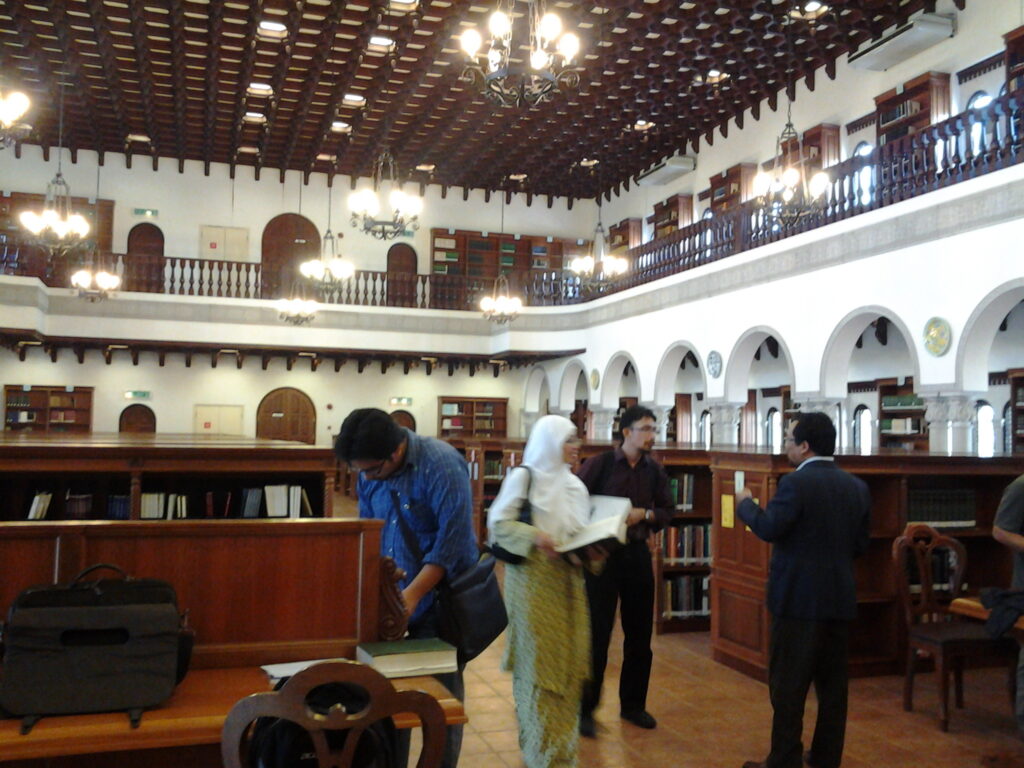
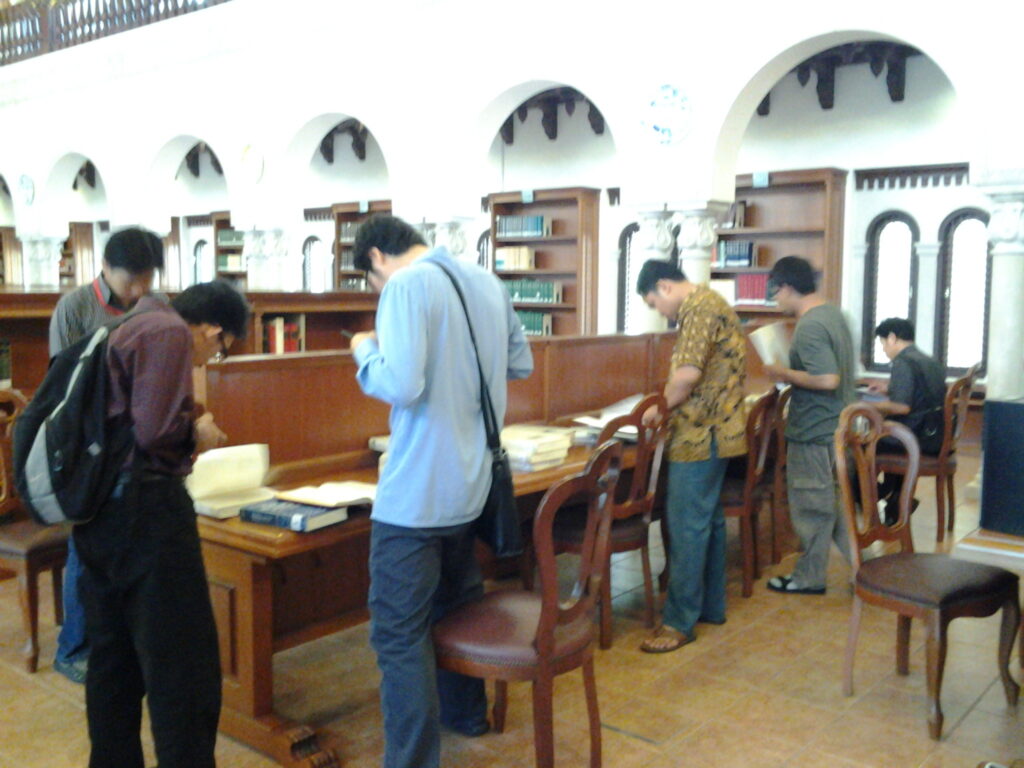
The bureaucratic(20) tendencies of maintaining principles within an institution were the result of the industrial spirit from the West of which they regarded institutionalisation as a rationalisation of men’s moral interaction with others around them, which is heavily influenced by their experience with the Christian church. They equate institutional experience as isolation, detachment, oppression, control, loss of identity and such. This is also the same spirit that exists in the attitude of the colonisers in their attempt to institutionalise by means of subordination and oppression. Having removed the place of God and religion in a society, the next step of institutionalising moral principles are for them, an act towards development and progress to achieve a work process independent of individuals and to reach automation in production.
The nature of knowledge as understood in Islam does not have this dichotomy of individual and institution. For one to create an institutional initiative that aims to arrive at knowledge with knowledge, Prof. Wan Mohd Nor Wan Daud expressed the need to have a “knowledge culture” in his Penjelasan Budaya Ilmu (Elaboration on the Culture of Knowledge),(21). He provided in his deliberation, a case of a fresh re-embodiment of how it was practiced in the Islamic Civilisation in history. Having knowledge culture is not just internalising the love of knowledge but also the inculcation of mature spirituality and ethical qualities in order to realise individual and collective potentials. The implementation of a knowledge culture within individuals is an initiative that addresses the problem of knowledge by making truth the main criteria of any action.
“The actualization of internal and external adab results in virtues whose impact is personal, institutional, scientific, artistic, societal, ecological and civilizational” (22)
Syed Muhammad Naquib al-Attas, “Acceptance Speech” Commemorative Volume on the Conferment of the Al-Ghazali Chair of Islamic Thought. (Kuala Lumpur: ISTAC, 1994) pp. 30-32
And this is what we experience at CASIS when individuals who are playing their part in externalising similar aims and objectives into action and at the same time contributing collectively, would then create an environment that suits the individuals that hold these responsibilities. Initiating knowledge culture within a person or society can thus be categorised as a type of institutional initiative that is educational, which means that it encompasses any form of action which is made to pattern after a system of order and discipline that reflects both truth and reality.
It has sparked my interest to consciously analyse all those years of encounters with individuals, other various initiatives and institutions, seeking to make a difference to our ummah through education. Arising from the midst of the modern confusion of the rightful aims and objectives of education, there are initiatives to revive education and learning within Muslim communities in every part of the world but mainly focusing on pedagogical methods. Nevertheless, despite the considerable collaboration with each other, these initiatives have yet to fully address the core and fundamental problem of knowledge without being caught within the milieu of the socio-politico and cultural narratives of Islam. Added to that, globalisation, technological advancements, and capitalistic ideals are unconsciously or consciously shaping their methods and directions whenever questions of expanding and operating within their educational initiatives come to mind. Emphasis on marketability and popularity in the social realm, as well as the emphasis on employability and functionality in economics, are the main currency for the various attempts to develop the Muslim community to the extent that knowledge and what is considered as principial and true were compromised through their efforts of representing Islam to the modern world.
In the end, for a knowledge culture to exist, one must still begin with the individual, hence as a matter of strong conviction guided by the true teaching of the Qur’ān, the Prophet, and intuition by God, Professor al-Attas as well as his students in the same spirit, are aiming to solve the root of the problem which is the individual— not at the lowest capacity that man could reach in regular action; instead, at the highest level of man’s intelligence, in scholarship. Without this, the inculcation of Islamic principles to contemporary knowledge would be rendered counterproductive, because knowledge culture cannot be retained in the society unless principal individuals who understand this are amongst them.
Having said all this, the importance and significance of an institute such as CASIS exist are obvious during our current times and the condition we are in. It is a necessary hub where individuals who are working toward the same aim can thrive and develop to their best potential. Without a stable, formal and recognised body to fend us from glaring community of corporations, we would not be able to gather, practice, make connections, inculcate, spread and educate the individuals who are pressured to live in a system that expects much of their time and energy just to be relevant. Such institutionalisation is needed, but so does the individualisation in a loose sense of the word. Institutionalisation acts as only a vehicle for movement to occur, so that networks and communications and a structure of authority would make up a stronger movement for our goals to be achieved.
The institutional form, however, must reflect man’s dynamic but stable faculties. When we say man, we don’t mean just any man, it must be the Perfect Man; the Prophet Muhammad is it in the case of our tradition. Each individual advocating change collectively should have this standard of virtues to achieve. The nature of institutions such as this is needed as a form of social mobility, hence the position of education and knowledge within that structure needs to be identified by virtuous acts. Therefore, we need to re-centre the structural discourse on social mobility towards keeping the integrity of knowledge among individuals within institutional settings for the purpose of preserving knowledge through transformation of the person itself. And perhaps from this, we can properly analyse the value of an educational institution through their effort to disseminate and preserve knowledge in order to keep the right tradition and rationale, and expand on what is meant by the university as an educational institution.
Reflecting what Prof Wan said:
“A confident, assertive, and yet truly moderate and civilized generation of scholars, leaders, intellectuals, administrators, and professionals in all fields with high personal discipline and integrity (adab) can be raised by learning from our past and present true reformers and by establishing and maintaining strategic social institutions (including those of higher learning) that are guided by the worldview and intellectual tradition of Islam, and interpreted and applied in a dynamically-stabilizing way.
Recognition by a community of its reformer’s ideas and practical contributions is a fair indication of its intellectual and moral maturity, but a proper acknowledgement of these ideas and contributions will ensure their lasting benefits for the Community and Humanity as a whole.”(23)
Wan Mohd Nor Wan Daud “Acceptance Speech”, Commemorative Volume on the Conferment of the Distinguished Syed Muhammad Naquib al-Attas Chair of Islamic Thought on Prof Wan Mohd Nor Wan Daud (Kuala Lumpur: RZS-CASIS, 2020), 24.
The situation at CASIS is unlike what one imagines to be a community of academics sitting comfortably on the ivory tower; we do not have the luxury of time nor the luxury of financial resources to nurture a certain level of understanding. Instead, we have something better. We are equipped with dedicated lecturers, dedicated students, and dedicated supporters despite all our disadvantages. Although it has only been 10 years, it has been 10 years’ worth of full dedication. The self-sustainment of the people inside CASIS shows that the relationships between students, lecturers, the admin staffs are also of great importance. It is here that I have learned the meaning of seeking knowledge, of companionship, of patience, of responsibility, of accountability, of tolerance, of passion, and last but not least, it is here that I have discovered myself. Maturing intellectually at CASIS has given me a chance to see things in the way of great individuals in the past because understanding comes best from experience. Through the CASIS students’ society, we are given a window to place things at their proper places and opportunities to implement what we preach through student academic and administrative activities.
Together, as we struggle to understand the meaning of seeking knowledge as a community of individuals, we could move and carry the knowledge culture to places we could not have imagined. What we did and have done are not insignificant as these khidmah have always been referred to as ‘housekeeping’ activities, nevertheless, it is ultimately a systematic way of sorting out our understanding through action that requires wisdom, to know where to put things at their proper places. It teaches us to have courage, to be brave to take up responsibilities and act upon what is right according to the limits and constraints with a full understanding of the meaning of temperance and justice. The classes in CASIS have given me a framework to reflect on and contemplate my surroundings, past experiences, or even other people’s experiences in order to fully understand and achieve ultimate certainty in my own religion, Islam.
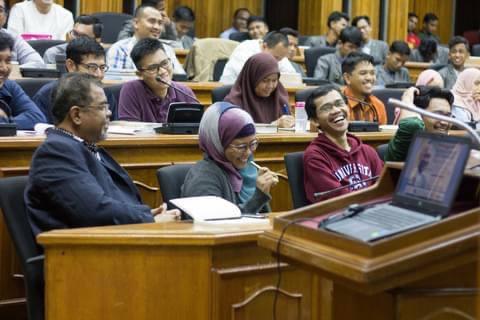
Sharifah Hajar Syed Ahmad Almahdaly is a Mathematics graduate from the University of Bath, UK and obtained a certificate in teaching at the Teachers Training College in Penang, Malaysia. She finished her Masters in Philosophy under the supervision of Professor Zainiy Uthman in 2016 at RZS-CASIS and continued to pursue her PhD at the same institution that same year. She coordinates the student academic activities, events, bookstore and social media at CASIS as well as the public program called WISE and WISE Summer School. Her current interest is on community building within the study of institutions and education in light of Al-Attas’ intellectual influences.
- The general office clerk, Puan Norehan, the director’s Personal Assistant, Puan Rashidah Sarip, and the Assistant Registrar, Puan Sharifah Fadzlina Al-Husaini.
- We had already had several big events in 2011 like the launch of Syed Muhammad Naquib al-Attas’ Feschrift (Knowledge, Language, Thought and The Civilization of Islam: Essays in Honour of Syed Muhammad Naquib al-Attas, edited by Wan Mohd Nor Wan Daud and Muhammad Zainiy Uthman, Universiti Teknologi Malaysia Press, Skudai, 2010) and his latest book at that time, Historical Fact and Fiction, both had a recurring lectures made by Prof. al-Attas as a commentary on the works.
- It began with Firdaus Pozi Rozi, as the secretariat for WISE program and member of HAKIM, who had provided the access to these reading materials and later on teamed up with Ahmad Saifuddin Amran to open their own bookstore called Pelita Dhihin. They now have a working bookstore selling high quality works in civilisational and religious studies www.kafilahbuku.com which became a motivational trend for other independent bookstores to open shop selling them across Malaysia, Indonesia, Singapore and internationally.
- “As an organization, HAKIM was officially registered on 06 January 2010. Nevertheless, the initial activities has already begun way back in 2002 in the form of monthly intellectual gatherings among small like-minded youth fired by the bold desire to recover, rejuvenate and make central again the culture of knowledge that is firmly rooted in the tradition of Islam. To achieve that objective, HAKIM programs and activities are directed at the long term civilizational revivification of the Ummah in general and Muslims in Malaysia in particular through well thought out, systematic educational, research and consultancy initiatives. This continuous activities bears fruits after nearly a decade when by now, bigger programs such as seminars, colloquiums, intellectual discourses and classes become core activities of HAKIM. Fellows of the Himpunan Keilmuan Muslim (HAKIM) are a group of young intellectual muslims acting as a think tank for subjects pertaining to the Worldview of Islam, Civilisational Studies, Islamic Thought and Education. HAKIM Fellows comes from various backgrounds and are coherent in their approach to Islamic Thought in relation to the contemporary challenges. In the context of contemporary Muslim society especially in Malaysia, the existence of HAKIM is aiming at filling the intellectual vacuum and barrenness especially among the youth. This can be seen from the fact that among various Muslim organizations that emerge in the country hardly we can find an organization that focuses on the intellectual dimension. Apart from its unpopular nature, the serious and deeply contemplative nature of such an intellectual movement as HAKIM is another obstacle that distances this movement to the masses. But for HAKIM members, this fact is consciously taken not as a hindrance to move forward but more as a challenge to continue burning the intellectual torch and to enlighten the whole humanity with the light of knowledge and wisdom. The need for strengthening the Muslim collective understanding about the meaning of self becomes ever more crucial today due to the nature of the challenges that face contemporary societies. The understanding of the true self can be acquired by enlivening the knowledge-culture via educational inputs.” – taken from HAKIM’s unpublished profile.
- Disclaimer: all profit received from the booksales under the name CASIS Bookstores are only used to restock new titles, to buy books for the CASIS library and small portion of it were distributed in terms of tokens to those who volunteer managing the bookstore.
- Like Puan Norehan, Puan Rashidah, Puan Nurhazirah and Cik Nur Fazreena.
- The Worldview of Islam Series (WISE.) at that time was a 9 months intellectual discourse program, organized by Himpunan Keilmuan Muslim (HAKIM) and Curiosity Institute (CI) that stand as an introductory course for understanding The Worldview of Islam. It is a continuation of the on going reading & discussion among small groups of people on Prof. Tan Sri Dr. Syed Muhammad Naquib Al-Attas idea of Ru’yatul Islam lil Wujud. During the formative years, the WISE program consists of 24 modules was divided into 3 semesters, covering variations of topics on the theme concerning the Worldview of Islam delivered by several respected scholars, some of whom being Professor al-Attas’s foremost students. The classes were scheduled on every Saturday from 9am till 1pm which were conducted in dual languages (English and Malay). The modules were: (1) Pandangan Alam Islam : Tinjauan Ringkas; (2) Wahyu (al-Qur`an dan al-Sunnah) : Kedudukan & Peranannya; (3) Insan : Hakikat & Sifat; (4) Alam Semesta sebagai Ayat-Ayat Allah; (5) Ilmu : Faham & Pembudayaannya; (6) Kebahagiaan (al-sa‘adah) & Tragedi (al-shaqawah) : Makna & Pengalamannya; (7) Masalah Luaran Kaum Muslimin & Cabaran Kebudayaan Barat; (8) Ancaman Sekularisasi terhadap Alam Tabii, Politik & Nilai; (9) Masalah Dalaman Muslimin: Kekeliruan Ilmu, Kehilangan Adab & Disiplin, Kepimpinan Palsu; (10) PengIslaman Ilmu & Dewesternisation dalam Pemikiran & Bahasa; (11) Ta’dib sebagai Faham Pendidikan Islam; (12) Islam & Perubahan Hebat dalam Sejarah Barat & Alam Melayu; (13)Epistemologi Islam; (14) Psikologi; (15) Teologi; (16) Kajian Agama: Sejarah & Falsafahnya; (17) Falsafah Moral & Teori Etika; (18) Falsafah Sains; (19) Tafsir, Ta’wil & Hermeneutika; (19) Usul al-Fiqh: Siyasah Syar’iyyah; (20) Usul al-Fiqh: Maqasid Syari’ah; (22) Etika & Kepimpinan; (23) Pengajian Melayu: Falsafah Sejarahnya & Peranan Islam; (24) Pemikiran Islam Semasa thought by Wan Mohd Nor Wan Daud (Prof. Dr.), Muhammad Zainiy Uthman (Prof. Dr.), Mohd Zaidi Ismail (Dr.), Mohd Sani Badron (Dr.), Mohd Farid Mohd Shahran (Dr.), Syamsuddin Arif (Dr.), Adi Setia Md Dom (Dr.), Wan Suhaimi Wan Abdullah (Dr.), Khalif Muammar bin A. Harris (Dr.), Asham Ahmad, Ahmad Bazli Shafie (Dr.), Aliza bin Elias @ Mayah (Dr.), Roslan Abd Jelani, Wan Azhar Wan Ahmad (Dr.) & Tatiana Denisova (Prof. Dr.).
- They were Dr Mohd Zaidi Ismail, Dr Mohd Farid Shahran, Dr Mohd Sani Badron, A/P Dr Wan Suhaimi Wan Abdullah, Dr Wan Azhar Wan Ahmad, Encik Roslan Abd Jelani. This association later registered as a Foundation under the name Ta’dib International Foundation. “Ta’dib International Foundation consisting of independent scholars and intellectuals with full sense of integrity and accountability who, through continual and constructive engagements with all related parties on various crucial levels, have been providing Islamic responses and solutions to the many challenges—intellectual, cultural, educational and scientific—of not only the modern world but also the diverse schools of thought, religious traditions and ideologies. Ta‘dib is currently active in presenting lectures in countless seminars and intellectual discourses and other educational activities not only in Malaysia but also in other countries including Germany, France, Greece, Holland, Sweden, Kosovo, France, Turkey, Iran, Japan, Australia, Thailand, Indonesia, Singapore and Brunei. Their aims are to publish the results of research and studies conducted from time to time for dissemination in the Muslim World; establish a specialised library, mainly digital, reflecting the religious and intellectual traditions of both the Islamic and the Western civilisations as a means to attaining the above aims and objectives; establish a network of smart partnerships with other organisations at local, regional and international levels; develop and establish an education curriculum that could serve the pressing need of the contemporary challenges of the muslim ummah and muslim world as a whole; train thought leaders who are deeply rooted in the proper Worldview of Islam.” -taken from Ta’dib International Foundation Profile.
- Some of them were Wan Ahmad Fayhsal, Syed Muhammad Muhiyuddin al-Attas, Muhammad Syafiq Borhannuddin, and Mohamad Zakki Azani. The second batch at CASIS that came from WISE was Muhammad Ikhwan Azlan, Haerul Anwar, Muhammad Husni Mohd Amin, and myself. Subsequent to that, the first batch of WISE who later on became CASIS students were Muhammad Syukri Rosli, Khairul Anwar Ismail, Wan Mohd Aimran, Elit Hidayat Ave, Fejri, Rizky Febrian, Aisyah Ngadiran, Niswa Noralina, Sarah Syafiqah and Nur Eisma Adibah.
- Wan Mohd Nor Wan Daud, “Accountability Enhancement: Some Religious, Historical and Educational Considerations”, 2001 [Published in Al-Shajarah, Volume 5, Number 2, 2000],37-39.
- These outside supporters were photographers like: Afiq Nasir, Muhammad Fahmi Lokman, Syed Yunus Almahdaly, Sharifah Nadiah Almahdaly, Sayyed Zayd Almahdaly, Syed Yahya Almahdaly, Syed Izuan Benyahya, Noorulzaman; videographers: Mohamad Akmal Zamri, Imran Ismail, Syed Mahdi Almahdaly; graphic designers: Syed Putra Iqmal, and Sharifah Durrah Almahdaly; social media: Nurshafira Noh; event managers: Fawdatuzzihan Suwandi, Sharifah Durrah Almahdaly and regular volunteers: Raja Nursyaza Adila, Muhammad Syahmir Anshun, Alif Faisal, Sarif Hidayatullah, Nuruddin, Hielman, Nursyamimi, Arif Rahman to name a few. Also, our CASIS students were also very much involved with the media team, like in photography: Haerul Anwar, and Mukhlas Nugraha; graphic design: Muhammad Syukri Rosli, Rizky Febrian, Yogi Theo Rinaldi, Hamzah Masleh; social media: Muhammad Syafiq Borhanuddin, Ahmad Khushairi, Nur Aizuddin Norafandi, Elham Khidir and myself.
- This initiative was made to allow young professionals who are active in seeking knowledge to be part of the intellectual tradition. An off shoot program from a WISE Alumni, Nur Aziz with the help of Syafiq Borhannuddin under the banner of HAKIM and CASIS through direct advice of Prof. Wan Mohd Nor. Several members eventually joined in to become a student at CASIS while working in their respective fields.
- Like Mohamad Fahroni Hamdan, Dayang Nurhazieqa, Nur Aizuddin and Nurhazfarahin
- Puan Rashidah, and Cik Nur Fazreena
- Muhammad Syukri Rosli and Norziati Rusman
- Some of those who were involved, headed by Dr Mohd Hilmi Ramli, were the CASIS Cores and Ahmad Zharif Zahir, Sania Sufi, Luqman Johani, Khairi Zainal, Dayang Nurhazieqa Hamzani, Nurhazfarahin Md Ali, Nik Ayman Azlan, Sarah Albani, and Sharifah Alubah.
- Arabic tutorials: Muhammad Zakki Azani, Ali Muchtar, Haerul Anwar, Rizky Febrian, Ismail Ya’u and Sid Ahmed Khireddine; English tutorials: Isa Martin, Khalina Khalili; Malay workshop: Hamzah Masleh.
- The society consists of several students at CASIS and audit students, such as Mohamad Fahroni Hamdan, Ahmad Khushairi Ismail, myself, Tania Zalina, Mutheerah Lutfiyyah, Muhammad Hasanul Arifin, Yogi Theo Rinaldi, Dr. Che Zuhaida Saari, Muhammad Farid Wajdi Bin Ab Rahim, Ahmad Basyir b Ab Latif, Tengku Nur Nabilah Putri Binti Tengku Alam Shah and Amirah Mardhiah.
- They are full time students like Dayang Nurhazieqa, Khairi Zainal, Hamzah Masleh, Nurhazfarahin, Nur Aizuddin Affandi, Sharifah Alubah, Nik Syazwan, Luqman Johani, Sarah Albani, Eisma Adibah, Nabilah Hasanah, Amru Khalid, Muhammad Yusra, Amirul Arif, Muhammad bin Mohamad Idris, Tania Zalina, Nurul Farhana, Fathiannisa, Azalia Shafira, to name a few. Auditing students are also very much helpful like Imran Halimi, Muhammad Fitri Tukimin, Mohamed Syahmir Anshun. Nik Ayman Azlan, Sarif Hidayatullah, Shameem Rumaisaa bt Wan Suhaimi, and Mior Muhammad Syahir.
- In my humble opinion, the general characteristics of bureaucracy are when: (1) roles and positions are independent of the individuals, i.e. replaceable; (2) regulations are there to ensure methodological continuation of action, not preservation of intentions; (3) rules and regulations are based on written contract which are manipulatable against all levels; (4) record keeping act as historical authority ; (5) personalization and privatization are minimised; (6) Value is based on one’s skills, merit and abilities to execute. Merit is based on records of qualification kept on you; (7) rules never change and are made detailed and technical, they are abstract and not direct.
- Penjelasan Budaya Ilmu (Elaboration on the Culture of Knowledge),Dewan Bahasa dan Pustaka, Kuala Lumpur, 1991
- Syed Muhammad Naquib al-Attas, “Acceptance Speech” Commemorative Volume on the Conferment of the Al-Ghazali Chair of Islamic Thought. (Kuala Lumpur: ISTAC, 1994) pp. 30-2; also his IS, pp. 142-144; idem, The Concept of Education in Islam (Kuala Lumpur: Muslim Youth Association of Malaysia, 1980), pp 22-27; Wan Mohd Nor Wan Daud, The Educational Philosophy and Practice of Syed Muhammad Naquib al-Attas: An Exposition of the Original Concept of Islamization (Kuala Lumpur: ISTAC, 1998), pp. 132-151, and idem, “Acceptance Speech”, Commemorative Volume on the Conferment of the Distinguished Syed Muhammad Naquib al-Attas Chair of Islamic Thought on Prof Wan Mohd Nor Wan Daud (Kuala Lumpur: RZS-CASIS, 2020), pp. 17-19.
- Wan Mohd Nor Wan Daud, “Acceptance Speech”, Commemorative Volume on the Conferment of the Distinguished Syed Muhammad Naquib al-Attas Chair of Islamic Thought on Prof Wan Mohd Nor Wan Daud (Kuala Lumpur: RZS-CASIS, 2020), 24.
